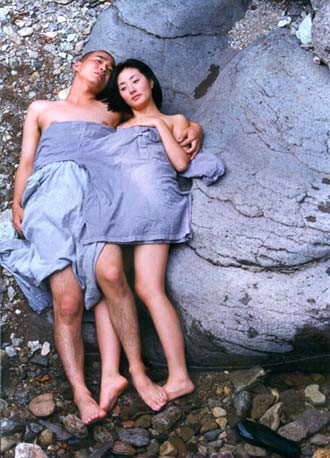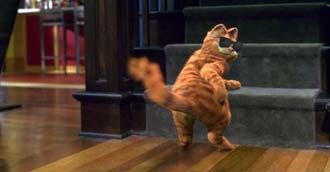|
Spring, Summer, Fall, Winter... And Spring (Bom yeoreum gaeul gyeoul geurigo bom) Writ. & dir. Kim Ki-duk; feat. Oh Young-soo, Kim Ki-duk, Kim Young-min, Seo Jae-kyung, Ha Yeo-jin (R) Antonio Vivaldi needed only four seasons to represent the cycles of life. But Korean director Kim Ki-duk assembles his film in five sections, repeating spring. Like Zhang Yimou's Raise the Red Lantern, which is also organized according to the seasons, Spring, Summer, Fall, Winter ... And Spring is a highly formalized, tightly framed study of a limited cast of characters within a single setting. A few visitors occasionally intrude from the outside world, but most of the film is confined to a tiny wooden monastery floating in the middle of a tranquil, secluded, sylvan lake. The exquisite color cinematography makes the film seem like a gorgeous travel pitch for rural Korea or a recruitment tape for Buddhist clergy. Each of the five sections opens with the shot of a ceremonial portal opening onto a view across the placid pond to the monastery. In the first section, the only two characters are an elderly Master (Oh) and a very young acolyte. Viewers curious about what a boy of about 6 is doing in this place must wait until section five for a plausible, explanatory parallel. The boy is naturally mischievous and derives sadistic pleasure from tying stones to a fish, a frog, and a snake. Under the patient guidance of the Master, the boy learns empathy for all creatures, though the lesson is not complete until much later, in a scene reminiscent of one in The Mission - Robert De Niro's penitential ascent of a cliff dragging a net filled with heavy armor - when he fastens a rock to himself and slowly makes his way upward to a nearby peak. Flashbacks to the fish, frog, and snake he had tormented as a child are superfluous. A viewer is not likely to need a Master to note the symmetries and analogies with which Kim constructs his film. In section two, summer, the arrival of a troubled young woman perturbs the acolyte, now 17. Lust goads him into abandoning the sanctuary and into violence. Returning many years later, he (now played by director Kim himself) engages in arduous rites of expiation. Eventually - and unsurprisingly - harmony is restored, and the life cycle continues. We know what spring brings before it comes again. For Spring, Summer, Fall, Winter ... And Spring, primal paradise is an exquisite arcadia inhabited only by two men of disparate ages who have as little need of women as of cable TV. To experience Kim's languorous film is to participate in its rituals of spiritual enlightenment, while accepting its premise that for women the flesh is willing but the spirit is weak. A lovely work to look at, it embodies instruction in forbearance, including tolerance for the merely picturesque. — Steven G. Kellman
Dir. Pete Hewitt; Prod. John Davis; Writ. Joel Cohen & Alec Sokolow, based on the comic strip by Jim Davis; feat. Breckin Meyer, Jennifer Love Hewitt, Stephen Tobolowsky; Garfield's voice by Bill Murray (PG) The 25-year-old comic strip leaps from the funny pages to the big screen in this movie devoted to Garfield, the curmudgeonly, rotund, yet lovable cat who gorges on lasagna, watches bad TV, and sleeps 18 hours a day. Just like many Americans. Jon (Meyer) tries to charm Liz, his former high school crush and veterinarian (Hewitt) by taking in Odie, a stray dog that has been left at the clinic. To Garfield's chagrin, Jon dotes on the new arrival, and perhaps in channeling his love for Liz, allows the dog to share his bed. A jealous Garfield lures and locks Odie out of the house, and as dogs tend to do when allowed to roam without invisible fencing, Odie runs away. Odie winds up kidnapped by washed-up TV host and cat-hater Happy Chapman (Tobolowsky), who wants to take him to New York City and incorporate him into a new act. During an afternoon of channel surfing, Garfield spots Odie on TV and, realizing that he misses his canine pal, sets off to rescue him. While this is a kids' flick, adults older than 30 who were weaned on Peanuts, and thus missed the Garfield craze, will snicker at cultural references such as the scene in which Garfield steals a pie from a windowsill and comments, "I love the smell of apple cinnamon in the morning. Smells like victory." And in a moment reminiscent of Animal Farm, Chapman, who uses an electric shock collar on Odie to train him to do tricks, gets his karmic retribution when stray cats and dogs surround him, place the collar around his neck, and zap him relentlessly. Two legs bad, four legs better. Garfield is the film's only computer-generated character, and he convincingly unlocks cages (with five fingers, not four, as most real cats have), reroutes trains, and prompts a prison break from the animal pound. Yet his human emotional qualities teach kids that animals can feel love, grief, jealousy, and pain. When Garfield discovers Odie is wearing an electric shock collar, he seems stunned, and exclaims, "That's inhumane." Garfield can also help children understand emotions such as sibling rivalry ("You're not his favorite anymore," comments a neighbor cat to Garfield), and loyalty, even among unlikely alliances: Lewis the mouse fends off a ratpack that corners Garfield in an alley; cats rescue dogs; dogs cuddle with cats. Whether you're a child or an adult, the most daunting fear is that of the unknown. As Garfield steps off the curb for the first time to rescue Odie, he announces, "Ladies and gentlemen, Garfield has left the cul-de-sac." In this act of bravery, Garfield realizes that to reap life's rewards, we often have to navigate a hostile world. — Lisa Sorg
Special Screenings Europa, Europa Dir. Agnieszka Holland; writ. Holland, Paul Hengge, Salomon Perel (book); feat. Marco Hofschneider, Solomon Perel, René Hofschneider, Piotr Kozlowski, Klaus Abramowsky, Michèle Gleizer, Julie Delpy (R) A tense adventure and a chilling meditation on identity and self-delusion, Europa, Europa is based on the memoirs of Holocaust survivor Solomon Perel. Perel, a young Jew, was born on Hitler's birthday - a coincidence that casts a shadow over how he survives World War II. As Russian and German armies tramp through Poland, Perel passes himself off as German; he eventually is taken in by Nazi soldiers who appreciate his facility as a Russian translator. Perel is sent to the Hitler Youth school, where he must pretend to participate enthusiastically in propagandistic lessons. Circumcised, he must guard his nakedness in public showers and in a budding romance, lest the Jew-hunters see that he has no foreskin. This physical fact may be the only thing anchoring Perel to his identity. Holland paints Perel as not entirely blameless in what he does to survive, but asks us to put ourselves in his shoes. — John DeFore Europa, Europa screens 7:30p.m., June 15 as part of Texas Public Radio's "Cinema Tuesdays" series at the Bijou at Crossroads Theater. Admission is $10 members / $12 non-members. 614-8977 or tpr.org for reservations. Celluloid Closet Dir. Rob Epstein & Jeffrey Friedman; writ. Epstein, Friedman, Sharon Wood (NR) An alternately hilarious and bittersweet examination of the way cinema has portrayed homosexuality, and how movies in turn have affected the public's perception of gays and lesbians, the Celluloid Closet became an instant classic upon its 1996 release. The film is based on historian and author Vito Russo's book of the same name, and includes interviews with notable actors, directors, screenwriters, and critics, including Gore Vidal, Susie Bright, Quentin Crisp, Tony Curtis, Armistead Maupin, and Susan Sarandon. "We have cooperated for a very long time in the maintenance of our own invisibility," wrote Russo. "And now the party is over." But the fun is just beginning. • Celluloid Closet screens 7:30p.m. Monday, June 14 as part of the Diversity Center's "Profiles in Pride" series at the Sweet Bean Café, 2300 N. St. Mary's. Admission is free. 223-6106 for more information.
|



